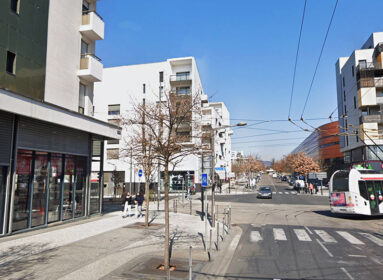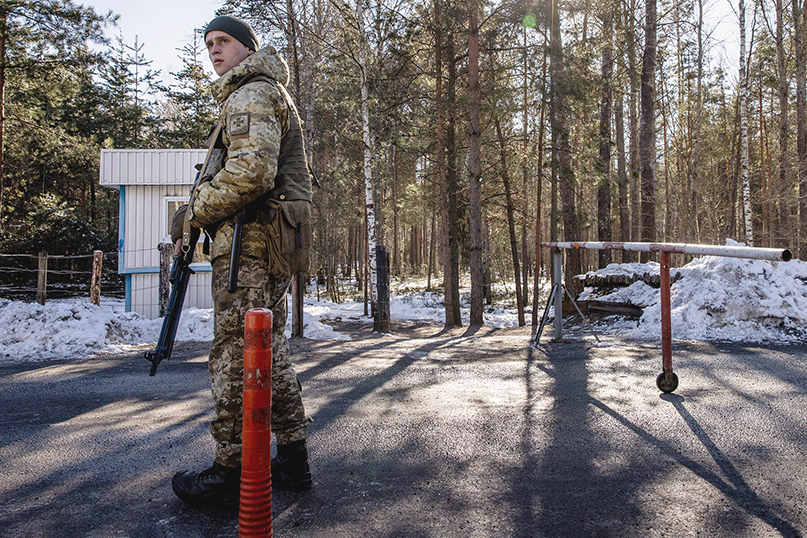
Jerusalem maintains delicate balancing act over Russia-Ukraine tensions
By Israel Kasnett
(JNS) The perceived Western European notion that a major war cannot again occur on the continent is quickly dissipating as Russia continues to threaten war with Ukraine. Even with the flurry of diplomatic activity on the part of the United States and Europe to reduce tensions, the threat is not going away and could materialize at any time.
“We are in the window. Any day now, Russia could take military action against Ukraine, or it could be a couple of weeks from now, or Russia could choose to take the diplomatic path instead,” U.S. National Security Adviser Jake Sullivan said on Sunday.
Since then, the situation has only escalated as Russian troops, in addition to at least six ships that have entered the Black Sea to boost its combat power, have moved in around Ukraine’s northern, eastern and southern borders. Its only reprieve remains NATO countries to its west.
Concerns abound that a full-scale invasion by Russia could result in as many as 50,000 civilian casualties and force some 5 million Ukrainians to become refugees. Israel, in particular, is engaged in preparations should the need arise to absorb Jewish Ukrainian refugees on short notice.
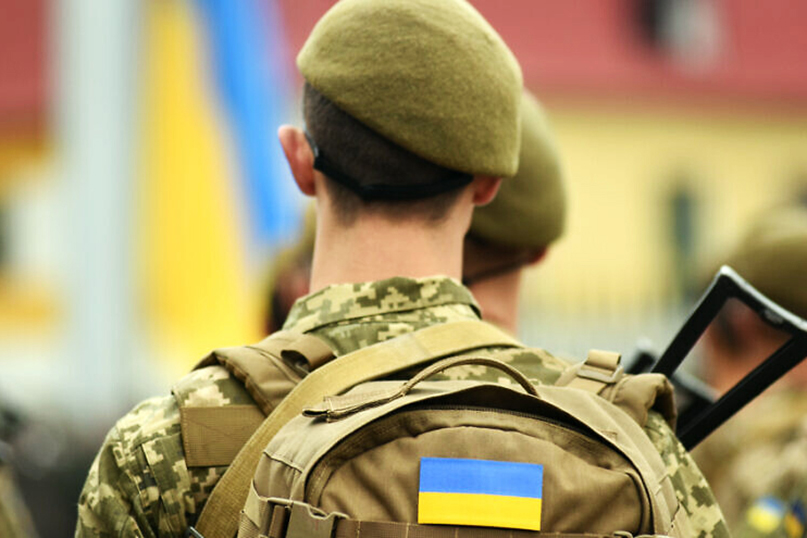
Ksenia Svetlova, a research fellow at Mitvim Israeli Institute for Regional Foreign Policies and a former member of Knesset, told JNS that while Israel is carefully preparing for a possible evacuation of Jews and Israeli citizens residing in Ukraine, “it is also careful not to make statements that will be perceived as an attempt to take sides.”
“In the event of war, where there may be multiple casualties, it may be difficult for Israel to maintain this neutral profile,” she noted, adding there might be “consequences for Israel” where it may need to support the American position or “interfere for the sake of the Jewish communities there.”
‘No one knows where Putin is headed’
Israel currently maintains a delicate balancing act as it works to preserve its good relationship with both Russia and Ukraine.
Dima Course, a postdoctoral fellow and lecturer in the Department of Middle Eastern Studies and Political Science at Ariel University, told JNS this situation “is specifically challenging from the Israeli perspective because of our alliance with the U.S.”
“However,” he said, “in most scenarios, the Israeli leadership will have enough space to maneuver between the sides.”
Course suggested this maneuverability is important since both Russia and Ukraine are “significant partners” of Israel.
This delicate balance became the focus of attention on Feb. 3 when Ukraine’s Ambassador to Israel Yevgeny Kornichuk criticized Israeli Foreign Minister Yair Lapid’s remarks regarding the Russia-Ukraine conflict in a statement posted on Facebook. The Foreign Ministry summoned Kornichuk for a reprimand.
As the world focuses on Ukraine, it remains clear to many experts that Russian President Vladimir Putin is attempting to use Ukraine as a pawn for the movement of larger ambitions in the region.
Zvi Magen, a former Israeli ambassador to both Ukraine and Russia, and currently a senior research fellow at the Institute for National Security Studies (INSS), told JNS that Putin’s main ambition is “to make Russia a global superpower.” Following that goal, Putin would like to keep ex-Soviet territories under Russian control. At a minimum, Putin wants to postpone Ukraine joining NATO for as long as possible and to end sanctions against Russia.
Addressing an INSS conference, Magen acknowledged that “no one knows where Putin is headed or how far he intends to go, including those in his immediate surroundings. The probability is low that Putin will go for an all-out war. Apparently, that’s also the assumption in the West. The question is what Putin will do instead.”
Magen said he thinks Russia is trying to prove it is a global power, in part by operating in Syria. And while Moscow has flexed its muscles on the Syria-Israel border recently, “there is no attempt to threaten Israel,” he stressed.
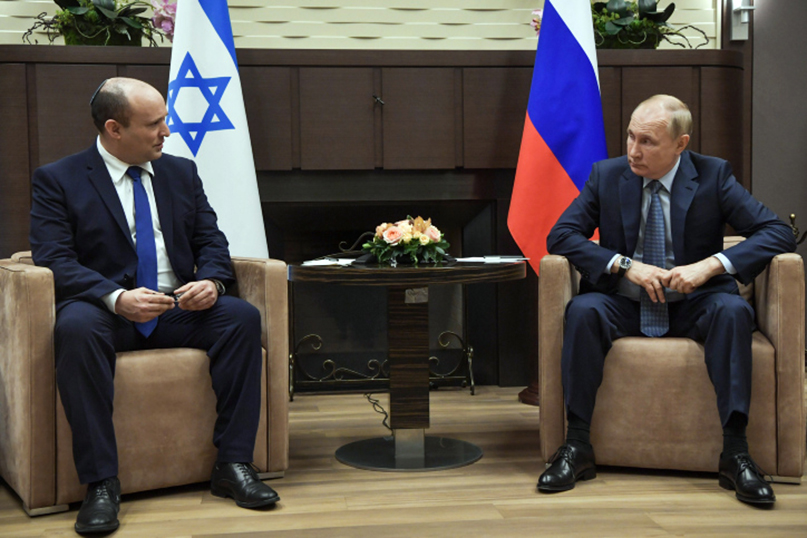
Photo by Kobi Gideon/GPO.
He emphasized that Putin would like to see a change in the world order, believing that there’s been enough of a unipolar world with one, single leading superpower.
“Western nations are willing to give Russia a ladder to climb down from the tree. Nobody knows what the next step is,” said Magen. “Putin is blatantly stepping on the table of the Western system hoping they will blink. There’s now another superpower called Russia that’s dictating the world order.”
‘Trying to restructure European security architecture’
Anna Borshchevskaya, a senior fellow at the Washington Institute, addressed an online conference held by the Jerusalem Institute for Strategy and Security (JISS) on Feb. 7, during which she agreed with other experts that this crisis “is manufactured by Russia” and is not “a situation born out of real concerns.”
“This is about a lot more than just Ukraine,” she said. “At the heart of the issue is that Western and Russian worldviews are coming to a clash. For the Kremlin, this is about fundamentally changing the post-Cold War world order. The Kremlin’s problem is that it cannot live in a U.S.-led world order.”
In addition, she said, “Russia is trying to restructure European security architecture, and that will have global implications.”
Borshchevskaya said what concerns her most is that the West will start to make concessions to Moscow. “That will be the worst thing possible because it will not end well for Ukraine,” she warned. “We need to move towards deterrence, which in this case, means hard power.”
Speaking at the same conference, Daniel Rakov, an expert on Russian policy in the Middle East and a fellow at the JISS, said that this crisis “is bad timing for Israel because it is concurrent with the negotiations with Iran in Vienna.”
“For Israel, this is an existential issue,” he said, adding that in Israel’s view, the Ukraine-Russia crisis is a distraction from a much more important issue.
Rakov noted that Russia is working to project power and influence. And in recent weeks, it has sent signals to Israel and Western powers that it can do so.
For instance, Russia was found to be using GPS jamming from Syrian soil, affecting large parts of northern and central Israel. It also conducted joint land and air patrols with Syrians near Israel’s border.
According to Rakov, “this signifies the tension in the air which Israel must consider.”
He also noted that Russia recently deployed ships to the eastern Mediterranean, the first major Russian military naval deployment there in years.
“More Russian deployment brings more Western deployment, so the eastern Mediterranean is quite a tense place currently,” he said. “These types of tensions have led Israel to keep a low profile on the Russian-Ukraine crisis.”
Rakov agreed with the other experts JNS spoke with that this is not a conflict between Moscow and Kyiv, but rather, a conflict about the world order. Offering advice to Israel’s leadership, he suggested that “as frustrating as it will be to our Ukrainian and Western partners, Israel’s obscure position best serves its interests.”
In Ukraine, young Jews are torn between fighting for their country — and leaving for another
By Cnaan Liphshiz
(JTA) – As world powers work to defuse the military buildup between Ukraine and Russia, Vlodymyr Zeev Vaksman, a Jewish father in Odessa, is focusing on a personal arms race.
“I put off making any big purchases. I want to buy weapons,” Vaksman, the 40-year-old chair of Odessa’s Tiferet Masorti community, told the Jewish Telegraphic Agency Monday.
Vaksman, who works as a tour guide, is typical of many young Ukrainian Jews: Attached to their country, they’re hesitant to abandon it when it’s threatened. But, mindful of how quickly it can descend into violence, sometimes along sectarian lines, they also are unwilling to leave their family’s safety to the authorities and chance.
“Everyone is worried,” Vaksman told JTA about his circle of Jewish friends. “Some want to resist and join the defense units. Some want to leave.”
Russia has been amassing troops on the Ukrainian border since November, leading many to fear that the country could be headed for a bloodier version of what happened when Russia invaded in 2014 and seized Crimea.
Like the United States, Israel is exhorting its citizens who are in Ukraine — there are as many as 15,000 of them — to vacate the country. On Tuesday, the Israeli airline Arkia is scheduled to dispatch one of its passenger planes on an emergency flight to Kharkiv, an eastern Ukrainian city. It will leave empty and return with any Israeli interested in returning.
Meanwhile, the Jewish Agency is reportedly making contingency plans to evacuate Jews who wish to leave in the event that tensions erupt into a full-blown war. Ukraine has about 43,300 people who self-identify as Jews and about 200,000 eligible to immigrate to Israel under its Law of Return for Jews and their relatives, according to a 2020 demographic study of European Jewry.
A prominent Israeli rabbi is using the crisis to convince Ukrainian Jews to make aliyah, or immigrate to Israel. But on the ground, most Ukrainian Jews appear to be approaching the situation pragmatically, not ideologically.
“It would be good” for anyone who so desires to leave Uman for “a vacation until it is safe,” Rabbi Ya’akov Djan, who is also an Israeli, wrote to Jews in the city where a predominantly Israeli Jewish population has grown up around the burial place of Nachman of Bratslav, an 18th-century Hasidic rabbi. But he added that anyone who does not wish to leave should not feel pressured to do so.
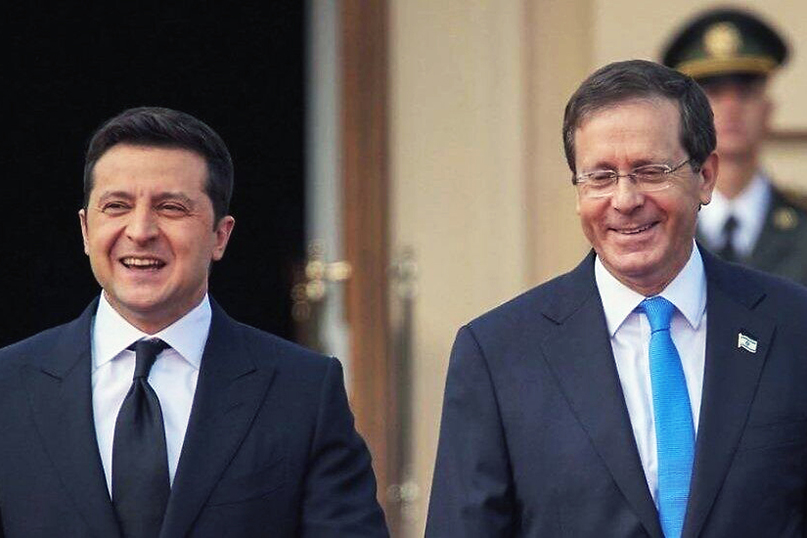
Among those on vacation in Israel right now are the wife and daughters of Chaim Chazin, a real-estate professional who was born in Israel and has been living for several years in Uman with his wife, Liat, and their seven children. They left two weeks ago for a family event and decided to extend their stay in Israel “just to be on the safe side until the situation stabilizes,” Chazin said.
Chazin himself says he is confident in the leadership of Ukraine’s Jewish president, Vlodymyr Zelensky, and believes that the current tensions are overblown.
“There’s fuel in the fuel stations, food in the markets, toilet paper and medicine in the stores,” Chazin told JTA. “The only ones freaking out are people who are following the conflict from outside Ukraine.”
He said he thought Djan’s letter was intended to encourage tourists who have come to Uman as pilgrims to Nachman’s grave to head home. “We don’t want them becoming the community’s problem in case of complications. Very few of us are leaving,” Chazin said.
Instead, he said, the local community is planning around concerns that, in the case of a Russian invasion, “all the law enforcement will be rushed to the border and we’ll be left exposed to robbers or whoever.”
Chazin said local Jewish leaders were working with Uman authorities on a plan to set up “some sort of armed guard, maybe with an AK-47 or two. We have some graduates of combat units of the Israel Defense Forces with us.”
In Kharkiv, an industrial city situated a mere 10 miles from the Russian border, the likelihood of an invasion is only now beginning to trickle down, according to Miriam Moskovitz, an emissary of the Chabad-Lubavitch movement who has lived in Kharkiv with her husband, Rabbi Moshe Moskovitz, since 1990.
“There’s been some general talk about how to prepare but now we’re really sitting down with plans about where people will go in times of danger, in terms of which buildings to put them in and what to do with the synagogue,” Moskovitz, a mother of 12 originally from Australia, told JTA. “We’re not afraid but we’re definitely sensing the tension right now.”
As with other Jewish communities, the one in Kharkiv, where about 20,000 Jews live, is focusing on making sure the elderly population and other vulnerable groups remain safe if traveling local roads becomes dangerous, she added.
As tensions rise, the Moskovitzs find comfort in the fact that even through the escalation, hundreds of worshipers come each day to the Kharkiv Choral Synagogue — a red-brick complex with a dome that resembles the condensed Jerusalem models of sculptor Frank Meisler.
“We do what we can, what we came here to do: We hold up Jewish life and make it happen no matter what,” she said.
As for Vaksman, he’s not eager to move to Israel, where he says he cannot afford to live. (It is not uncommon for Jewish Ukrainians who have moved to Israel to return because of the cost of living.) But he’s keeping the option open.
In addition to working to procure guns, he said, he has “prepared money, documents for the children and even the cats” to board a rescue flight if they need to.
Main Photo: A member of the Ukrainian State Border Guard stands watch at the border crossing between Ukraine and Belarus, Feb. 13, 2022. (Chris McGrath/Getty Images)








 Southern New England Jewish Ledger
Southern New England Jewish Ledger